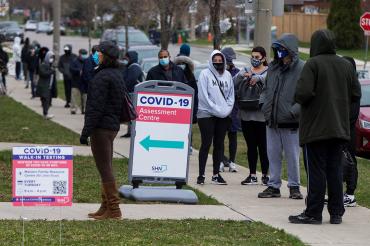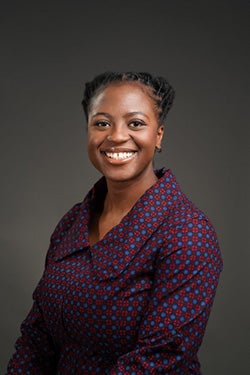U of T researcher examines how COVID-19 progressed differently in different parts of Toronto

(Photo by Zou Zheng/Xinhua via Getty Images)
Published: April 18, 2023
Afia Amoako, a third-year PhD student in the division of epidemiology at the University of Toronto’s Dalla Lana School of Public Health, wants to provide a deeper, more nuanced understanding of how people living in the city experienced COVID-19.
“I’ve always been interested in public health research that focused on the people, rather than the numbers,” says Amoako, adding that she is keen to examine the unequal landscape of the COVID-19 pandemic in Toronto.

A recipient of the inaugural Emerging and Pandemic Infections Consortium (EPIC) Doctoral Awards, Amoako’s doctoral research aims to combine spatial and mathematical modelling methods with contact tracing, laboratory testing and census data to paint a fulsome and dynamic picture of COVID-19 in Canada's largest city.
“In Canada, we have very good administrative data and good contact tracing information, but we don’t really have good race-based data,” Amoako says. “The goal of my thesis is to try and put together as much data as I can from different sources to add the ‘people’ element to how we understand the pandemic.”
Her research – which she is pursuing with Dalla Lana School of Public Health Professor David Fisman – focuses on the first two years of the pandemic when access to PCR testing was more widely available. To capture the missing details about the people affected by COVID-19, Amoako is using data from the 2021 census and the Ontario Marginalization Index (ON-Marg), a tool that combines a wide range of demographic indicators to quantify different dimensions of marginalization, including poverty and housing.
She has already completed the first objective of her thesis: analyzing what COVID-19 looked like over space and time during the first four waves of the pandemic.
“Early on in the pandemic, most of the COVID-19 cases were towards the edges of the city, which tend to be lower-income areas,” says Amoako, who studied immunology as an undergradute student at U of T before heading to McGill University to pursue a master’s in public health. ”Then, as the pandemic progressed, particularly with the Omicron wave, the cases really started to centre downtown. That was very interesting to see.”
Next, she will incorporate the sociodemographic data from the census and ON-Marg into her analyses and develop a mathematical modelling approach to understand how the pandemic progressed differently in different parts of the city.
Amoako hopes her research will lay a foundation for how research on infectious diseases can and should adopt a person-centred approach.
“We cannot do research on infectious diseases without talking about the diversity of people who are being impacted. There has to be a discussion about people’s diverse experiences – that is what I really want to achieve through my work.”



